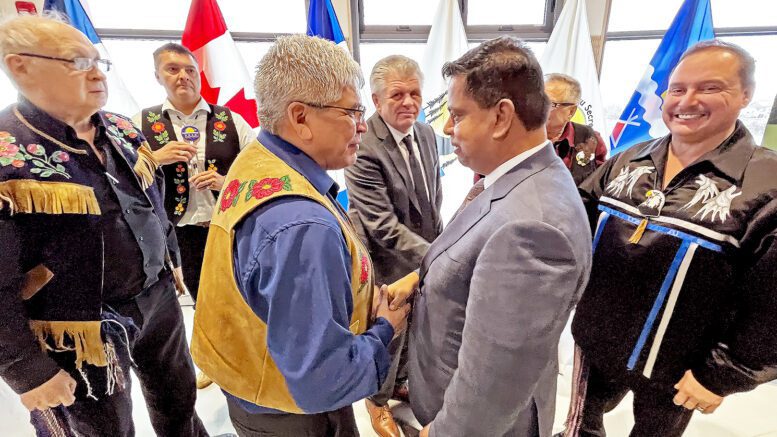Drummers, woodsmoke and dancing helped usher in an historic $375 million agreement in Behchokǫ̀ that will fund Indigenous-led conservation, stewardship, and economic development across the Northwest Territories.
Known as NWT: Our Land for the Future, one of the largest Indigenous-led land conservation initiatives in the world promises to create transformative benefits on the ground for lands and waters, climate resilience, cultural revitalization, and local economies.
The excitement from the podium was palpable.
Deline Chief Danny Gaudet was one several dignitaries invited to speak at the podium in front of the community’s packed cultural centre’s hall, on Thursday for the invite-only portion of the day.

The Behchokǫ̀ cultural centre’s hall was full of invited guests and leaders to introduce NWT: Our Land for the Future partnership. (James O’Connor/CKLB)
He said this agreement is a major step towards reconciliation.
“You know, our motto in Délı̨nę is: Our People. Our Future. It’s important to look after the land, but we are nothing, if we lose our people, we need to find our people,” he said.
“We’ve been taken off the land starting back in 1921 … Treaty 11 was signed here to Northwest Territories, is designed to remove us from who we are, take us out of the elements that we grew up in, and this signing allows us to go back.
“It’ll help us go back to our traditions and our culture.”
The plan pledges to help diversify the regions’ economy, supporting hundreds of jobs per year, including seasonal, part-time, and full-time positions, over the first decade.
The agreement will invest $375 million in Indigenous-led conservation, stewardship, and related activities in the NWT.
That includes $300 million from the Government of Canada and $75 million from private donors.
Tłı̨chǫ Government Grand Chief Jackson Lafferty said by continuing working together, Indigenous people, other levels off government and the private sector will achieve great things.
“This is how we support Tłı̨chǫ self-sufficiency and honour our responsibility to serve for all time being custodians of our land, waters and resources … being able to set our own priorities,” he said, the Tłı̨chǫ acting as hosts for the announcement.
“It is another step on a new journey. We will take care of the land, the water, the animals, the plant life, and also take care of our communities and our people.”

Tłı̨chǫ Government Grand Chief Jackson Lafferty at the podium, with a stuffed furry friend in the foreground. (James O’Connor/CKLB)
Information supplied to the media stated jobs will be spread across many communities, not just concentrated in Yellowknife.
Lafferty has stated conservation and development will continue to balance economic benefits with cultural and environmental values.
The plan is to follow existing land-use decision-making processes that will provide greater certainty around where conservation and development will be prioritized.
The initiative will support a range of conservation and stewardship activities:
- Establishment of new protected and conserved areas identified by Indigenous Governments.
- Guardians programs.
- Climate monitoring and community resilience in the face of wildfires and low water levels.
- Associated economic development opportunities compatible with conservation and stewardship.
- On-the-land cultural and language revitalization programs.
NWT Métis Nation President Gary Bailey said the current Our Land for the Future plan will need to extend beyond its 10-year life.
‘We definitely need to look beyond 10 years so that it’s full time, lifetime jobs for our people,” he said.
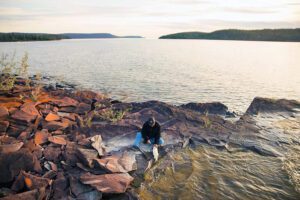
The new initiatives will support establishment of new protected areas identified by Indigenous Governments, similar to Thaidene Nëné, which was created in 2019. (Photo courtesy of Pat Kane/Indigenous Leadership Initiative)
“There’s no sense going out getting trained and 10 years later it’s ‘Sorry, the funding is gone. You guys got to go somewhere else.’ Canada really has to look at that and make sure that this is this is forever.”
Earlier on Thursday morning, Minister of Crown-Indigenous Relations Gary Anandasangaree toured the aging 50-year old Chief Jimmy Bruneau Regional High School with Grand Chief Lafferty and met with staff and students.
“Indigenous peoples have called this place home for millennia — stewards of these lands, waters and ice, caring for their homelands and its wildlife,” he said.
“But the North is increasingly under threat, and I don’t have to tell you this as a Southerner, global warming, Is impacting these areas three times the global average, melting permafrost and causing drought conditions and longer and more intense wildfire seasons.
“The Government of Canada recognizes that it is critical that we protect and conserve lands and biodiversity now and for future generations, and that we cannot do this with our true partnership and leadership of indigenous peoples.”
Tom Dillon with the Pew Charitable Trusts spoke on behalf of the private donors.
“As someone who is not a Northerner, when I come up here and see the abundance of water and land that you have, it is it is truly astounding,” he said.
“This goes back 100 years or more … when many peoples were removed from the land, and where your relationship with your land became more difficult. So, I want to thank you for welcoming someone like me who is not a Northerner, as well as the private donors that I’m standing here representing today, welcoming us into this process with you.
“As non-Indigenous people, we really have no idea what you have been through as you were colonized. However, I am happy that we can support your dreams and your visions in this kind of initiative, to do a small part in assisting with what all of you have referred to as reconciliation, what has been discussed today about your peoples getting back on the land, about future generations and how really this is about the grandchildren, the children, and looking out over the next several generations.”
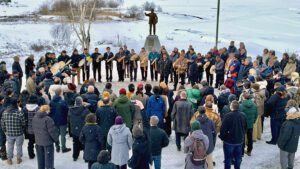
A feeding the fire ceremony took place prior to the inside program heralding the NWT: Our Land for the Future partnership. (James O’Connor/CKLB)
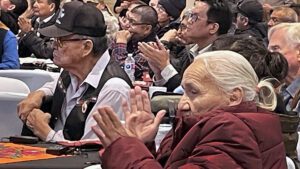
Members of the audience listen to speeches welcoming the NWT: Our Land for the Future partnership. (James O’Connor/CKLB)
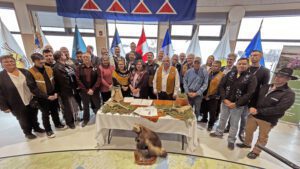
Participants sort themselves out for a group photo on Thursday at the NWT: Our Land for the Future partnership celebration. (James O’Connor/CKLB)

